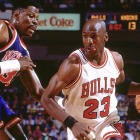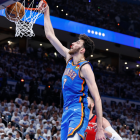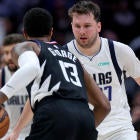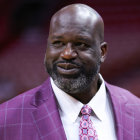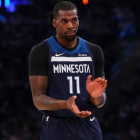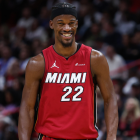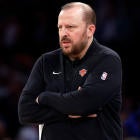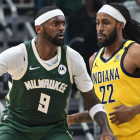"The Last Dance" premiered last week with episodes 1 and 2 and it triggered a ratings boom. Episodes 3 and 4 of the 10-part series on the 1997-98 Chicago Bulls aired Sunday night. As was teased all week, Dennis Rodman's personal story as well as where and how he eventually fit in with the Bulls after serving as a core piece of their biggest rival, the Detroit Pistons, for so long served as a focal point.
Through four episodes, there still hasn't been a ton of footage from the 1997-98 season, which, of course, is supposed to be the central theme around which this entire story is built. It's been mostly backstory so far, which is fine, because it's all nostalgic and great. But we're all waiting on the really exclusive, behind-the-scenes footage that was gained when the film crew followed the team around that season.
To that point, film creator Andy Thompson promised the coming episodes will ramp up in terms of inside access to the team and what they were navigating as that final season together came down the pike. For now, here are six big takeaways from episodes 3 and 4.
1. Dennis Rodman was WILD!
There's a bit of footage that shows Dennis Rodman, after the legendary Vegas vacation (more on that below), in the weight room. He appears to be resting after or during a workout, drinking out of a paper Gatorade cup. And just before he puts it to his mouth, he turns to the camera, raises the cup slightly and says: "kamikaze." Then he downs whatever's inside the cup, and ever since I saw that in an advanced screener I have not been able to stop thinking ...
Was Rodman honestly hydrating with booze during a workout?
Obviously, he could've been joking. You can't see inside the cup. But the fact that I can't dismiss the possibility that a professional basketball player was boozing during a workout, in plain view, with a camera on him, is incredible. Imagine some player doing that today. That's how wild Rodman was, and how much leash the Bulls gave him, which these episodes aimed to depict.
Of course, Rodman's "vacation" was covered. I mean this dude went to his coach, in the middle of a season, and straight up requested PTO to go to Las Vegas with Carmen Electra. This man is a hero.
Rodman was also, by all accounts, a first-class teammate. Michael Jordan called him "one of the smartest guys I played with." Scottie Pippen said Rodman fit with the Bulls "like a hand in a glove." When Pippen was out during the first two months of the season, Phil Jackson said: "Dennis is what held us together."
Whether Rodman was able to hold himself together was a different story. That was always a touch-and-go situation. The story of Rodman being found sleeping in his car with a rifle, presumably having been contemplating suicide, is a dark reminder that all the Vegas parties and hoop earrings and dyed hair were in many ways a cover for a pretty fragile, vulnerable, largely depressed person.
You hear about his upbringing and it makes sense. By his own admission, he was living in the streets for two years, and every day he had a chance to go down the wrong path.
"I could've been a drug dealer. I could've been dead," Rodman said. "I don't know why I never did that drug stuff, but I never did. I'd just sit there and watch them do it, watch them sell it and stuff like that, and I'd walk out the door every day. I was fortunate to pick up a basketball at start playing. And I just got lucky that some guy from some college said, 'Dennis you want to play for us?'"
Rodman's story really illuminates the underdog foundation of those Bulls teams. Yes, Jordan was a chosen one, but John Paxson, Steve Kerr, Ron Harper, Bill Wennington, Luc Longley, Toni Kukoc ... you can down a long list of Bulls contributors and not find a single All-Star appearance among them. Horace Grant and Bill Cartwright have just one each. Even the great Phil Jackson was coaching the Albany Patroons when Jerry Krause plucked him from CBA obscurity.
Pippen, as we learned in episode 2, was a ball boy for a Division II college and basically finessed his way onto the team. Rodman went from "in the streets" to a junior college by sheer coincidence. He's now a five-time NBA champion and in the Hall of Fame. There is one thing Rodman said in the opening of episode 4, however, that I have to take issue with:
"You've got the great Michael Jordan, the great Scottie Pippen, the great Phil Jackson, but if you take me away from this team, do they still win a championship? I don't think so?"
Let's remember, the Bulls won three consecutive titles before Rodman joined them.
2. The Shot, with an assist from Lenny Wilkins
Everyone remembers Jordan's game-winning shot to take out the Cleveland Cavaliers in the first round of the 1989 playoffs, and in that frame is always poor Craig Ehlo helplessly trying to defend a space-walking freak disguised as a basketball player. What's interesting, that I never really thought about until now, is that Ehlo was guarding Jordan to begin with.
"They had Craig Ehlo on me, which honestly was a mistake," Jordan said. "Because the guy that played me better was Ron Harper."
Harper, for his part, wasn't happy about the assignment, either.
"We're up by one, I said [in the timeout]: 'Coach, I got MJ. I got MJ,'" Harper recounted. "So the coach [Lenny Wilkins] tells me I'm gonna put Ehlo on MJ. And I'm like, 'Yeah, OK, whatever. F--- this bullshit.'"
What was also interesting was Jordan reminding us that in those days teams played division opponents six times in the regular season, and the Bulls were 0-6 against Cleveland that season before they met in the playoffs. Everyone had picked the Cavs to win, and Jordan, famously motivated by every slight ever thrown his way, made sure to call out all the writers who'd predicted a Cleveland victory both in his postgame interview at the time and even looking back some 30 years later. He is a champion grudge holder.
"We finally got over the hump of losers mentality [with that shot]," Jordan said. "We were starting to become a winning franchise. And the sky was the limit."
3. The Jordan Rules weren't that complicated
You would think that a defensive strategy that inspired an entire book to be written would be, you know, somewhat different than your average defensive approach. It really wasn't. As explained by former Pistons assistant coach Brendan Malone, the Jordan Rules were as follows:
"On the wings, we were going to push [Jordan] to the elbow. We're not going to let him drive to the baseline," Malone explained. "Number 2: When he was on top, we were going to influence him to his left. When he got the ball in the low post, we were going to trap him from the top. That's the Jordan Rules, and it was that simple."
In other words, this famous defensive strategy, from a basketball standpoint, basically consisted of pushing a great scorer to his weak hand and/or in the direction of help, and double teaming him in the post. Not exactly revelations. Malone was then asked: "What happens when Jordan does make it to the basket?"
"That's when Laimbeer and [Rick] Mahorn would go up and knock him down to the ground," Malone said.
And that, ladies and gentlemen, was the real spirit of the Jordan Rules. Beat the living you-know-what out of him.
"As soon as he steps in the paint, hit him," John Salley said. " ... The referees back then didn't look to see if Michael was hurt or not. It wasn't, make sure that the savior is OK. That wasn't the way it is."
"Chuck Daly said, 'this is the Jordan Rules. Every time he comes to the basket, put him on the ground.'" Rodman, who of course played for the Pistons at that time, recalled: "We tried to physically hurt Michael. ... I compare Michel Jordan to nobody. Because for him to survive that [kind of punishment] and still maintain that greatness, it's unparalleled."
The Bulls lost to the Pistons in both the 1989 and 1990 Eastern Conference final, and in those days, superstars didn't bolt to join other superstars when they couldn't get the championship they so desired on their own. They went back to work and tried their luck against next season. Indeed, Chicago eventually triumphed over Detroit in the 1991 conference finals before going on to win their first championship.
4. Jordan's career comes full triangle
When Doug Collins was hired as the Bulls coach in 1986, Jordan called him a "breath of fresh air," adding that Collins, "designed an offense to support the way I wanted to play." In other words, he gave Jordan the ball and basically told everyone else to get the hell out of the way. Literally. After Jordan's aforementioned game-winner against the Cavs in 1989, Collins was asked in his postgame press conference what the play design was on the final call.
"That was the 'get the ball to Michael, and everybody get the f--- out of the way."
It wasn't the worst strategy, but it wasn't getting the Bulls past the Pistons, who had their ways of "defending" Jordan. Enter Phil Jackson, who was hired to replace Collins, after the Bulls had just made it to the conference finals, prior to the 1989-90 season. Jackson didn't believe in handing Jordan unilateral control of the offense, and Jordan was skeptical.
"I wasn't a Phil Jackson fan when he first came in because he was coming in to take the ball out of my hands," Jordan said.
Jackson, with a historic assist from Tex Winter, instituted the famous "triangle" offense, a more egalitarian system with increased options that favored ball movement and empowered role players. Pippen evolved into one of the first true "point forwards" inside the new scheme, and Jordan, though reluctant at first, found life to be a lot easier when the defense couldn't just focus on him.
Through this lens, you can really see the impact Jackson's coaching had on Steve Kerr, who played on those Bulls teams and eventually instituted a similar offensive approach when he replaced Mark Jackson -- and his Collins-like traditional, iso-heavy offense -- as coach of the Golden State Warriors.
Fans had a hard time adjusting to, and accepting, the ball not being in Steph Curry's hands as often, but like it did for Jordan and the Bulls, it worked. The Warriors won the first of three championships in Kerr's first season at the helm. The Bulls won the first of their six titles in Jackson's second season.
5. Jordan still hates Isiah and the Pistons
In addition to being probably the best player to ever live, Jordan might be the greatest grudge holder we've ever seen. He still hates the Pistons. "I hated them," Jordan said of his view on Detroit during his career. "The hate carries even to this day. They made it personal. They physically beat the s--t out of us."
Some of this hate, of course, continues to stem from the Pistons' infamous walk-off in the 1991 Eastern Conference finals. The Bulls, having lost to Detroit the previous two seasons, had finally gotten over the hump and were 7.9 seconds from sweeping the Pistons. But the Pistons weren't about to give Chicago any satisfaction. Before the game could end, Detroit walked off the court. No shaking hands. No congratulations. They just rolled right past the Chicago bench and into the locker room, and Jordan has never forgotten it.
Thomas, for his part, claims in the documentary that this was simply the way things were done back then. And besides that, if there was any blame to go around, he pinned it on Bill Laimbeer.
"That was the only time that I think I'd ever been swept in a series. I was normally the one doing the sweeping," Thomas said. "Their time had arrived, and ours was over. As we're coming out of the game, Laimbeer said: 'we're not shaking their hands.' ... Knowing what we now know, in the aftermath of what took place, I think all of us would've stopped and said congratulations like they do now. But in that period of time, that's just not how it was passed. When you lost you left the floor. That was it."
In a cool directing maneuver that is utilized throughout the documentary, Jordan is handed an iPad so that he can watch Thomas make his case, and as the iPad is offered to him, Jordan is already shaking off any potential Thomas excuse and looks like he can hardly stomach even looking at it.
"I know it's all bullshit," Jordan said before he grabbed the iPad. "Whatever [Isiah] says now, you know it wasn't his true actions then. [He's had] time enough to think about it, or the reaction of the public that's changed his perspective. ... You can show me anything you want. There's no way you can convince me he wasn't an asshole.
"All you have to do is go back to us losing in Game 7 [the previous year]," Jordan continued. "I shook everybody's hand. Two years in a row, we shook their hands when they beat us. There's a certain respect to the game, that we paid to them. That's sportsmanship. No matter how much it hurts, and believe me it f-----g hurt. But we didn't have to shake their hands. We knew we whipped their ass already. We got past them. And to me, that was better in some ways than winning the championship."
For the record, Thomas admitted way back in 1991, just a few months after the incident happened, that walking off the court without shaking the Bulls' hand was "the wrong thing to do" and "unsportsmanlike."
6. Michael bests Magic, proves he's human
Jordan details the desire he harbored to be spoken about with the same reverence as Magic Johnson and Larry Bird. Jordan, in essence, was seen as a great talent, a great scorer, a great athlete, but not necessarily a guy who made his teammates better and ultimately carried franchises to championships. Think modern-day Russell Westbrook. Big numbers. Little impact on elite-level winning. Or so the perception goes.
So Jordan getting his first title by beating Magic's Los Angeles Lakers was extremely special, and what I really found fascinating was listening to Jordan's teammates talk about how shocked they were to see the emotion Jordan showed when he was famously crying while hugging the Larry O'Brien trophy doused in champagne.
"He's jumping in the air and he's all excited [on the court]. That's who we knew. The competitive Michael Jordan. The win-at-all-costs Michael Jordan," former Bulls center Will Perdue reflected. "Sometimes we questioned whether he was human. Whether he had feelings. The only emotion we'd ever seen out of him was frustration or anger. We were literally stunned to see those emotions [with the trophy]."













